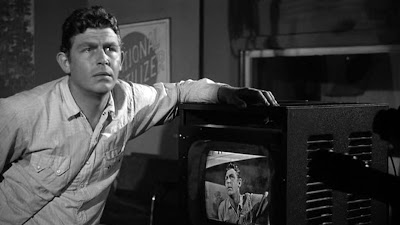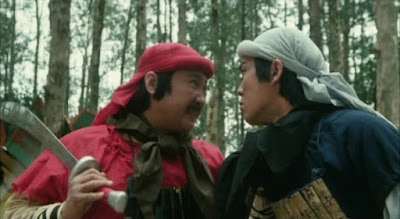It wasn't as good a year for me as far as my rigor in catching up with 2011 releases go. As I'm sure I've mentioned on this blog before, now that I'm living in New York—2011 was my first full year as a New Yorker—I'm even more spoiled for choice than ever. For me, that meant that, when presented with the choice of taking a chance on a new release versus catching up with cinema history by seeing an older film, I often found myself going with the latter option...at least until I came back from my San Francisco vacation in late October, when it seemed like I suddenly felt less of a desire to keep up the same torrid theater-going pace as I managed before. (That may be about to change with Film Forum's upcoming Robert Bresson retrospective in January—Bresson being a major filmmaker whose work I have barely seen, outside of maybe five minutes of A Man Escaped.)
All of that is my roundabout way of saying that the following list of my 10 favorite films of 2011 is by no means complete, and is subject to change once I actually do catch up with some of my major blind spots this year—Of Gods and Men, To Die Like a Man and The Arbor are three that immediately come to mind. Maybe, when I catch up to those, one or all of them will end up bumping a title out of my current Top 10.
For now, though...here is my list (based on a large pool of films that received a release of a week or longer here in New York):
10. Heartbeats. Xavier Dolan's glamorous love triangle certainly had style to burn, but behind the swoon-worthy Wong Kar-Wai-ish aesthetic was an intelligent examination of the way we all tend to deceive ourselves in the game of love.
9. Melancholia. With his last film, Antichrist, Lars von Trier kept telling the world about how his film was meant to be an expression of the deep depression he experienced while making it. Maybe the after-the-fact clarity of that experience helps explain why Melancholia seems so much more powerful in that regard. It's not only a visually stunning end-of-the-world saga, but also one of the most vivid dramatizations I know not only of one person's depressive state of mind, but of the effect of her state on those surrounding her.
8. Beginners. Perhaps someday I'll work on that piece I've been meaning to write about the similarities between this film and my No. 1 pick for this year (what, you think I'm going to spoil that for all of you now?). For now, all I'll say is: "insufferably quirky"—a common charge lobbied against Mike Mills's second feature—is the last thing that came to my mind (other than the dog subtitles, I suppose); instead, its melancholy, reflective, almost fragile vibe is what came across most movingly for me in this essayistic exploration of people who still seem to be discovering things about themselves and the ones around them even in adulthood.
7. A Separation. Asghar Farhadi's devastating film is a richly drawn humanist drama that obliquely suggests the complexities of life in Iran in its gripping, evenhanded exploration of one couple's titular separation and the effects it has on many other characters.
6. Cave of Forgotten Dreams. Even more so than in his previous documentary, Encounters at the End of the World, Werner Herzog—working for the first time in 3D, no less—finds the awe in nature, in history and in humanity as his camera probes around the oldest-known cave paintings in the Chauvet caves in Southern France.
5. Uncle Boonmee Who Can Recall His Past Lives. Apichatpong Weerasethakul's latest meditation on the intersection of history and memory is as warm and formally mesmerizing as it is quietly profound—in short, the Thai director working once again at the height of his powers.
4. Certified Copy. Abbas Kiarostami goes international for his latest film, but he is still as concerned as ever with the bridge between reality and art. Thankfully, as was the case with his 1990 masterpiece Close-Up, his intellectual concerns never get in the way of the human drama at the heart of this increasingly surreal chronicle of a couple falling apart and reconnecting. But wait—is what we're watching "real" or not? What is real in the film and what isn't? Most importantly: In the search for greater emotional truths, how much does "reality" matter, in the end?
3. Love Exposure. Love, sex, family, religion—Shion Sono's grand, mad epic has it all, and somehow manages to sustain both narrative interest and thematic richness over a four-hour span. Ever since it played to great acclaim here in New York two years ago at the New York Asian Film Festival, I've been dying to finally see this film; it was completely worth the wait.
2. Margaret. Kenneth Lonergan's passion project finally made it to theaters after years of legal struggles, and even in less than its creator's ideal form, this is still a dazzling, insightful and profoundly moving film that seems to contain years of life experience in its chronicle of a young woman's guilt and maturation after her involvement in a tragic traffic accident.
And finally.............
1. The Tree of Life. Terrence Malick attempted to encompass no less than the entirety of existence in this head-spinning folly, but the most surprising thing about The Tree of Life is how its grand, humbling ambitions don't dwarf the wrenching familial drama at the center of it all. The Artist? Bah! It's cute and all, but it's got nothing on this awe-inspiring piece of cinema, folks.
Other 2011 film releases I especially liked (in alphabetical order):
13 Assassins, Takashi Miike
The Autobiography of Nicolae Ceauşescu, Andrei Ujicâ
Bellflower, Evan Glodell
Contagion, Steven Soderbergh
A Dangerous Method, David Cronenberg
Film Socialisme, Jean-Luc Godard
House of Pleasures, Bertrand Bonello
The Interrupters, Steve James
Into the Abyss, Werner Herzog
Martha Marcy May Marlene, Sean Durkin
Mysteries of Lisbon, Raúl Ruíz
Petition, Zhao Liang
Poetry, Lee Chang-dong
The Skin I Live In, Pedro Almodóvar
Tabloid, Errol Morris
Tuesday, After Christmas, Radu Muntean
Special honorable mention: the belated theatrical release of Edward Yang's A Brighter Summer Day (1991) in a new restoration courtesy of the World Cinema Foundation.
Finally, here are 10 older films—plus one special honorable mention—that I discovered this year that hit me the hardest (again, in alphabetical order):
A Face in the Crowd (1957, Elia Kazan)
A Woman Under the Influence (1974, John Cassavetes)
All That Jazz (1979, Bob Fosse)
Deep End (1970, Jerzy Skolimowski)
Do the Right Thing (1989, Spike Lee)
Handsworth Songs (1987, John Akomfrah)
I Only Want You to Love Me (1976, Rainer Werner Fassbinder)
Le Rayon Vert (1986, Eric Rohmer)
Re-Animator (1985, Stuart Gordon)
Seven Chances (1925, Buster Keaton)
Honorable mention:
Zu: Warriors from the Magic Mountain (1983, Tsui Hark)—mostly because it was probably the most exhilarating action picture I saw all year (and yes, that includes The Adventures of Tintin and Mission: Impossible—Ghost Protocol)
Here's to another year of cinematic discoveries and explorations!












No comments:
Post a Comment